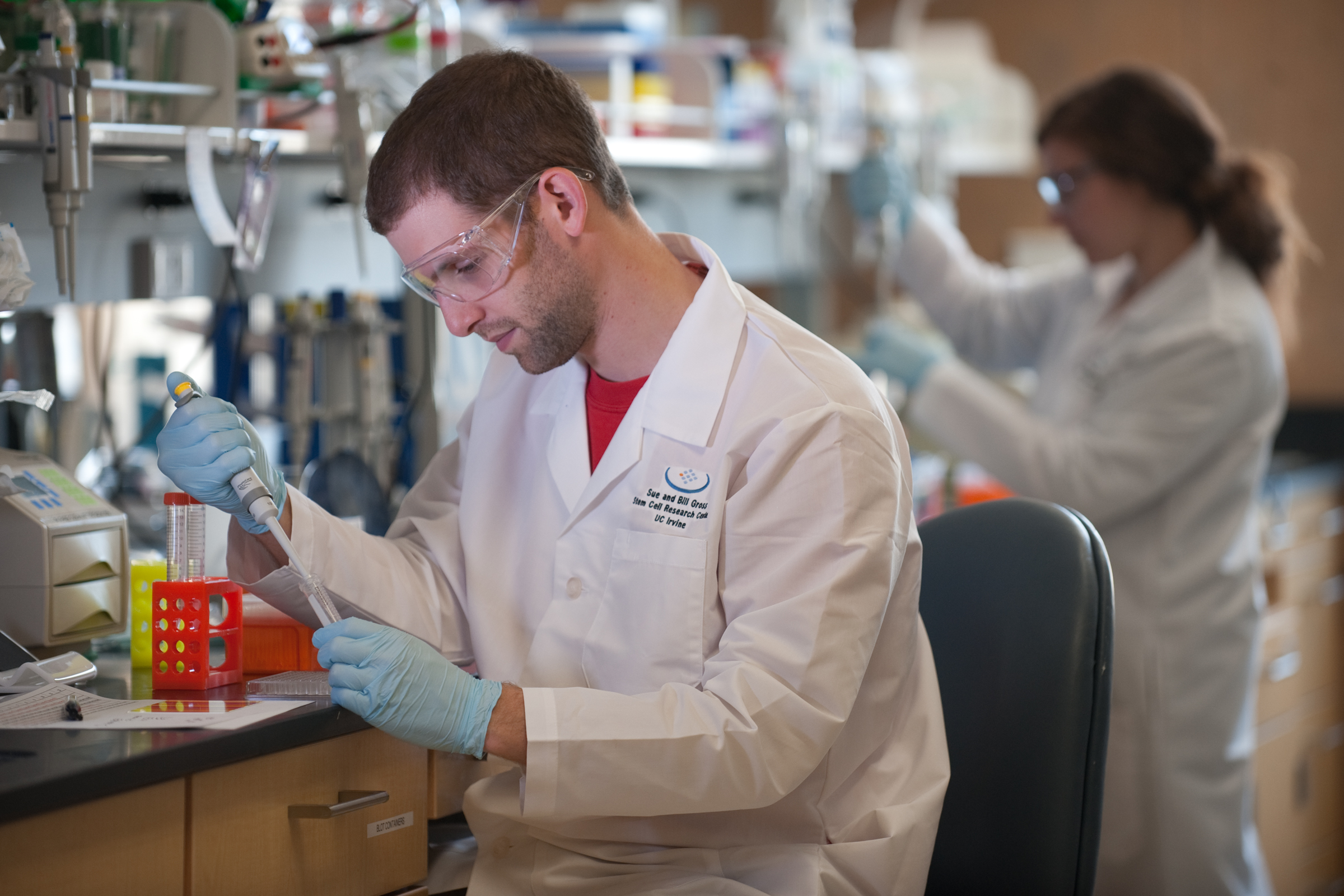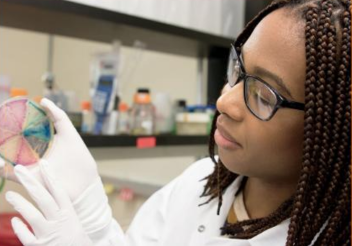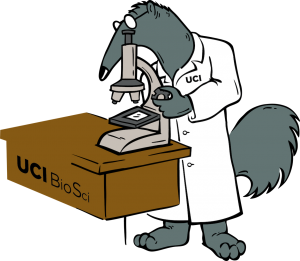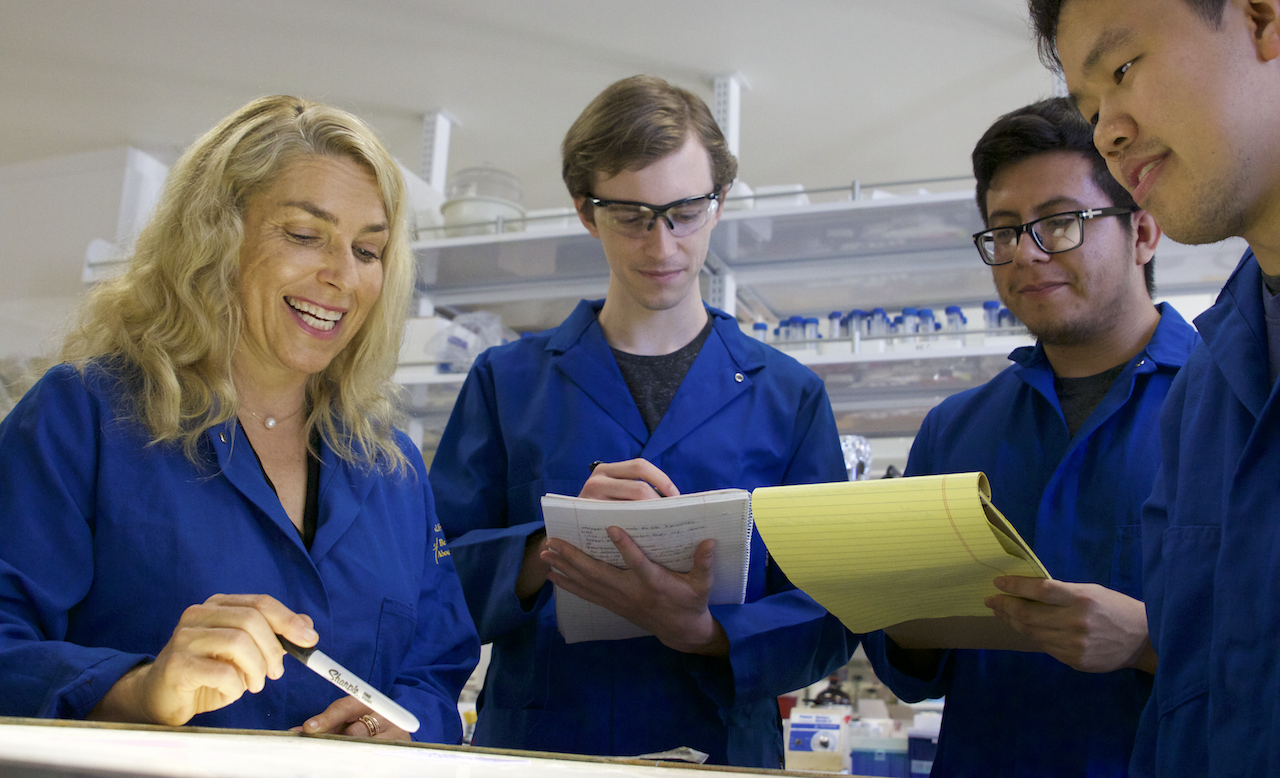Training the next Generation of Biologists
The overarching goal of the CMB program is to launch the careers of the next generation of scientists who will tackle some of the most important questions facing humankind. Our program has a strong emphasis on teaching students how to conduct state-of-the-art research in a rigorous manner while at the same time providing them with the soft skills that will help them be successful throughout their careers. These include communication skills, conflict resolution, personnel engagement and management, assertiveness, etc. With a diverse student population we strive to adapt our training for each individual to ensure that each of our trainees maximizes their opportunity for success. This page begins with information about the first year curriculum. Scroll down for information about year 2 and beyond.

First Year
Faculty Advisors
For the first year, students will be paired with a faculty advisor. They will meet at the beginning of each quarter for personal academic advising to help select appropriate courses, and emphasizing the importance of laboratory rotation experience. Included will be the value of identifying potential rotation labs, making clear intentions after selecting a potential thesis advisor, and the need to demonstrate a commitment to research. Advisors are drawn from each of the six departments, and each advisor will meet with two students.
Coursework and Class Schedule
During the first year, students are required to take courses selected from a menu of options that cover fundamental concepts. The menu of course options allows the student, in consultation with his or her advisor, to optimize the course curriculum to the student’s background and research interests. In addition, all students in the program are required to take “Ph.D. Fundamentals” in Fall quarter, “Research Methods” in the Winter and “Responsible Conduct of Research”, currently offered in the Spring quarter. A voluntary student-only journal club is offered during Winter and Spring quarters.

Focus Areas:
Students will pick one of five Focus Areas, each with its own required and recommended courses.
- Cancer and Cell Biology
- Developmental and Stem Cell Biology
- Genetics, Epigenetics and Genomics
- Immunology and Microbiology
- Structural Biology, Biochemistry, and Biophysics
Choice of a primary Focus Area is non-binding.
Research Rotations
In order to become familiar with the research opportunities available in the program, and to obtain technical training in appropriate areas, students are required to complete two laboratory rotations, each lasting one quarter, in different laboratories during the first year. Three are recommended in order to increase exposure to diverse research topics and experimental approaches. The Program Director provides incoming students with a list of laboratories hosting rotation students, and additional guidance will be provided by the CMB faculty advisors during orientation week.
First Year- Successful Completion of the Program
A trainee will be judged as having successfully completed the program provided that they have:
- Achieved at least a B (3.0) average in the core courses, and
- Achieved a satisfactory grade in each quarter of Mol Bio 291, 295 and MMG 250, and
- Achieved satisfactory grades in all rotations, and
- Identified a participating faculty member who has agreed to serve as their thesis advisor.
The Program is designed with THREE lab rotations during the academic year (2024/25). The program does not provide funding, nor an additional rotation after July 1.
Mini-symposium
At the end of the Fall and Winter quarters, groups of four students present short talks about their rotation research. Feedback is obtained from the Faculty Advisors and fellow students who attend the mini symposium. The goal of the mini symposia is to help prepare students for the preliminary exam in June.
CMB Handbook
Navigate through your graduate career. The CMB Handbook provides graduates with information curriculum, housing information, and organizations.
Information and Guides
Information about enrolling in rotations and completing required proposals and reports is available here:
Preliminary Examination
At the end of the first year, students must demonstrate proficiency by passing a preliminary qualifying exam.
The possible outcomes of the exam are: Pass. Fail with an opportunity to retake the exam within one month. Fail. The committee decision is referred to the Program Director for action. Students who pass the exam will normally move immediately to departmental Ph.D. Programs.
The purpose of this exam is to verify that you have completed the goals of the CMB first-year program.
- to establish a foundation of knowledge in the relevant disciplines
- to acquire an understanding of research methods including the responsible conduct of research
- to sharpen your critical thinking abilities so that you are ready to begin thesis research in which you will take major responsibility for the design, conduct and publication of Ph.D.- level research projects.
Second Year
Thesis Advisors
Students must have selected a thesis advisor and entered the advisor’s laboratory by the end of the third quarter of the first year. The thesis advisor must be a faculty member associated with the program who has supervised one of the student’s rotations and has agreed to advise and sponsor the student for the entire period of graduate study. Students can select a thesis advisor earlier in the year if they have completed two rotations already.

Graduate Advisors
In the second and subsequent years, students leave the CMB gateway program and become affiliated with one of the six participating departments. Each department has a faculty member who serves as the Graduate Advisor for that department and who can also answer questions on curricular and other requirements. PhD students in years two and later take elective courses relevant to their area of specialization. Certain departments and training grant programs may have specific recommendations for Elective courses. The Graduate Advisors are also available to advise first-year students who are developing an interest in a specific department. They can give advice on selecting laboratory rotations or elective courses.
| Department | Advisor | Phone Number | Email Address |
|---|---|---|---|
| Biological Chemistry | Dr. Kyoko Yokomori | 949-824-8215 | kyokomor@uci.edu |
| Developmental and Cell Biology | Dr. Christine Suetterlin | 949-824-7140 | suetterc@uci.edu |
| Microbiology and Molecular Genetics | Dr. Bert Semler | 949-824-7573 | blsemler@uci.edu |
| Molecular Biology & Biochemistry | Dr. Mei Kong | 949-824-5244 | meik1@uci.edu |
| Pathology and Laboratory Medicine | Dr. Edwin Monuki | 949-824-9604 | emonuki@uci.edu |
| Physiology and Biophysics | Dr. Lan Huang | 949-824-8548 | lanhuang@uci.edu |
Teaching Requirement
Teaching is a formal degree requirement of the doctoral degree in the School of Biological Sciences (BioSci), but is optional in the School of Medicine. Visit the Faculty & Research tab for a list of participating departments and schools in the CMB program. For CMB students entering departments in BioSci, two quarters of 50% appointment are required. Teaching assignments are generally completed in one quarter each of the second and third years. The teaching requirement must be completed before Advancement to Candidacy, or be specifically deferred or waived by the Associate Dean of Graduate Studies for the School of Biological Sciences at that time. To be academically qualified to serve as a Teaching Assistant (T.A.), a grade point average of 3.1 is required by the Division of Research and Graduate Studies at UCI. In addition, all students for whom English is not the first language must have passed the Test of Spoken English (TSE) exam with a score of 50 or better. No exceptions will be made. Further information about TA assignments can be obtained from the Program Director.
Advancement to Candidacy Examination
Before the beginning of the 10th academic quarter and usually during the third year of graduate study, students advance to candidacy by presenting a thesis proposal to a committee of five faculty members, including a majority from the relevant department and one member from outside the department. The student’s thesis advisor usually serves as Chair. This committee guides and advises the student and monitors research progress throughout the remainder of graduate training at UCI.

Thesis Research
Students select a thesis mentor and laboratory at the end of the first year and then devote most of their time to laboratory research leading to publications and a Ph.D. thesis. They also continue to take courses and to participate in journal clubs and seminars as specified by departmental and track requirements and recommendations.
Students are also encouraged to present their work in written (posters) or spoken (talk) form with the consent of their faculty mentor.
Time to Ph.D. completion
Completion of the Doctoral degree should normally occur before the beginning of the 16th academic quarter (beginning of sixth year). The maximum time to complete a doctoral degree is before the beginning of the 22nd academic quarter (beginning of eighth year).
Employment outside of the CMB Program
Employment while a graduate student in a doctoral program at the University of California is NOT ALLOWED in any capacity, not even part-time employment. This is a regulation of the University of California. Any student who has a job while holding an appointment as a graduate student in the CMB program may be considered for automatic dismissal. Students should be aware that graduate study towards the Doctor of Philosophy degree is a full time endeavor. For this reason, the UCI Division of Research and Graduate Studies does not allow students to pursue a doctoral degree on a part time basis. All Ph.D. students must be enrolled as full time students every quarter of their graduate training at UCI.
Questions
First-year students should consult with their CMB faculty advisor on any academic issues including rotations, courses, graduate requirements, and exceptions.
Program Administration
The Program Administrator, (Morgan Oldham/LOA) Gary Roman @ gary.roman@uci.edu – 949.824.6226, should be consulted on administrative issues related to registration for classes, lab safety training, student finances, and requirements to establish residency.
(Morgan Oldham/LOA) Gary Roman
Program Administrator
CMB

